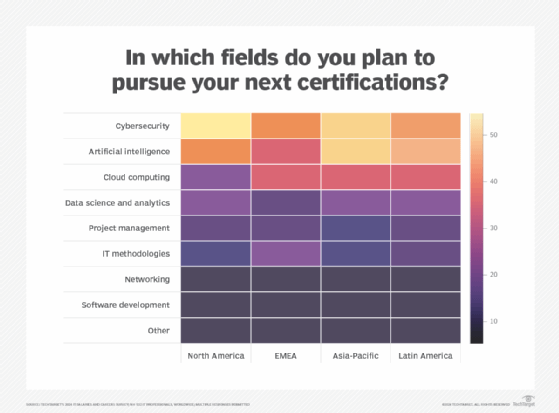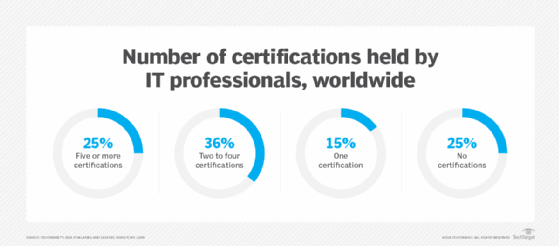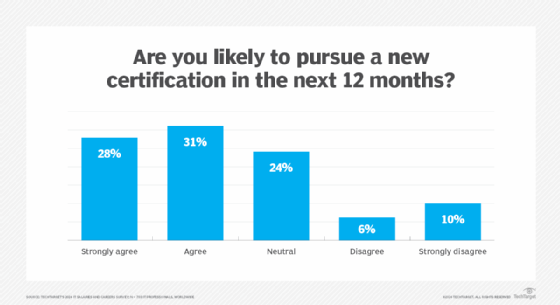IT professionals are primarily focusing on cybersecurity and artificial intelligence for their upcoming technology certifications – a trend evident globally based on the results of a recently released survey.
TechTarget Annual IT Salary and Career Surveyconducted earlier this year, surveyed more than 1,000 respondents to assess the state of technology certifications in the North America, EMEA, Asia Pacific, and Latin America regions. Three-quarters of tech professionals surveyed have at least one certification, and 59% of a more targeted group of 703 respondents said they were likely to obtain a new certification in the next 12 months.
Forty-eight percent of the 532 respondents planned to make cybersecurity one of their next certifications, making it the most popular choice worldwide. AI certifications came in second, with 41% identifying this as a goal. Cloud computing comes in third with 33%, followed by data science and analysis at 22%. The question on certification plans allowed for multiple answers.
Cybersecurity certifications reflect a recurring IT concern
Unsurprisingly, cybersecurity is a top certification priority for businesses, given the ever-present demand for technical talent in this area. Abhinaya Tayi, CIO at Forwardis, a freight forwarding company headquartered in Berlin, Germany, has placed cybersecurity as his IT team’s top certification priority. This priority aligns with the company’s top IT concerns.
“One of the biggest challenges I see is cybersecurity (and) the current rise in ransomware,” she said.
Tayi said that ISACA’s Certified Information Security Manager and ISC2’s Certified Cloud Security Professional rank among the best cybersecurity certifications of interest to the organization.
Cloud certifications are another priority – one closely linked to cybersecurity, Tayi noted. Its IT group uses the Microsoft Azure cloud for a lot of design and development work. It is therefore important to be certified on the resource management, design and security aspects of the platform. But cross-cloud knowledge is also valuable, she added.
“In general, I think it’s good to be certified on any type of cloud (platform): AWS, Google or Azure,” she said.

AI certifications are gaining ground
In the TechTarget survey, AI emerged as a preferred target for upcoming certifications. But the options available are somewhat fewer than in more established areas such as cybersecurity and the cloud. This is particularly the case for Generative AI (GenAI). Human resources professionals run into this problem when evaluating tech talent, according to the operator of the tech careers website Dice.
“Hiring managers and recruiters often rely on formal certifications to determine whether candidates have the necessary combination of experience and skills for the role,” said Art Zeile, CEO of Dice. The lack of “clear criteria” in complex areas such as GenAI makes it difficult for HR professionals to assess technical skills, he noted.
Dice’s 2024 Tech Sentiment Report, released in September, highlights a lower level of assurance when it comes to assessing AI skills. The report, which surveyed 390 HR professionals, found that 84% considered themselves extremely or very competent when recruiting technology professionals. But 73% of respondents feel the same way about their knowledge of AI professionals.
The outlook for skills assessment, however, is beginning to improve as more and more AI certifications emerge.
“There are already several certification programs available, but the landscape is still developing,” said Quynh Nguyen Ba, senior vice president and head of Asia Pacific and Japan market at Hitachi Digital Services, the technology services subsidiary of Hitachi Ltd, based in Japan. .
Nguyen cited online courses and specializations focused on generative adversarial networks and natural language processing, naming Coursera and Udemy as two providers. He also listed cloud platform providers such as AWS, Google Cloud and Microsoft, emphasizing that the providers’ certifications cover their GenAI APIs and services. Additionally, he mentioned Databricks, a data analytics platform provider, which offers GenAI engineering certification.
Zeile cited Microsoft’s Azure AI Engineer Associate, AWS Certified Machine Learning – Specialty and Google Cloud’s Professional Machine Learning Engineer as examples of specific AI certifications.
University establishments also now offer an AI training course. Andy Lin, CEO of Provoke Solutions, a technology services company based in The Colony, Texas, said he has seen a recent increase in executive education programs on GenAI at universities such as Columbia, Harvard and MIT. These programs stem from schools’ previous certification programs in traditional AI.
“Over the last six months to a year, they’ve really expanded the certification to include generative AI,” Lin said.

Cloud and data offer the path to AI
A little technology professionals are not ready to move directly towards AI or GenAI certification. Instead, they could follow a step-by-step progression that starts with other technologies and builds from there.
Tayi said she encourages such an approach, citing data science certification as a first step toward AI programs. Becoming a data engineer is another natural starting point for Forwardis’ technical employees, who accumulate GPS location and customer data, she noted.
A similar trend emerged at Hitachi Digital Services.
“Most of our staff seeks certifications for cloud architect, data engineer and data analyst roles,” Nguyen said.
The momentum behind these certifications will continue for months, if not years, according to Nguyen. But AI and GenAI will add weight to data and cloud certifications, providing differentiation as employees pursue this path, he added.

Benefits and limitations of certification
Certification plays several roles in the technology industry.
For technology employees, certification validates their skills, enhances career prospects, improves job performance and provides professional recognition, Nugyen said. Employers benefit from a higher level of expertise among their employees, increased productivity and a greater competitive advantage. Additionally, companies that encourage certification demonstrate a commitment to professional growth that contributes to employee retention, he said.
Sixty-seven percent of 6,166 people surveyed by Dice for its latest annual tech sector salary report, released in January 2024, identified training and education as an important workplace benefit, noted Zeile.
Certification provides foundational knowledge that can help tech workers upskill in a rapidly changing market. But practical experience is also essential, according to Lin.
“What will be important is for people to apply what they have learned,” he said.
Practical experience is particularly important in areas such as generative AI. Different GenAI tools require different rapid engineering Techniques and challenges specific to particular use cases add another layer of complexity, Lin said. Future GenAI specialists “won’t learn the nuances” of a certification program, he said.
“Adding or subtracting a word from a prompt can make a huge difference,” he said. “You have to go out there and play with these tools.”
John Moore is a writer for TechTarget Editorial covering the role of the CIO, economic trends and the IT services industry.


